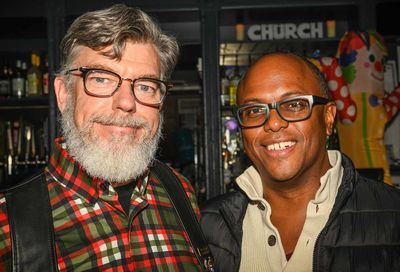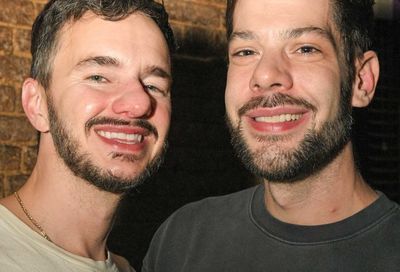A Long Road to Equality
Marriage equality for gays and lesbians is the latest chapter in the District's history of civil-rights achievements
”By not fully asserting ourselves and trying to get the license, we would be agreeing with society that our relationship is less than other marriages.”
Nearly 20 years ago, that’s how Craig Dean made the case for marriage equality, filing a legal challenge when he and his partner, Patrick Gill, were denied a marriage license from the D.C. Clerk of Court.
Dean and Gill were in their 20s, activists who received the ire of the gay and lesbian establishment for bringing such a case, here, at that time. The executive director of Lambda Legal Defense Fund was described in The Washington Post as ”the couple’s most outspoken critic.”
Despite that opposition, the men went forward with their lawsuit, where they were represented by then-Georgetown Law Professor William Eskridge. They were opposed by the city, lost in a trial court opinion that cited from the Bible and lost again in a 2-1 decision in the D.C. Court of Appeals.
All was not lost, however, as one judge – Judge John Ferron – thought it possible that the men could have proven to the court that prohibiting the men from marrying violated the constitutional protections of equal protection. As he concluded, quoting from an earlier U.S. Supreme Court case describing marriage as a ”noble” purpose:
”I see no basis on this record, or in law, for concluding summarily that…a homosexual couple, cannot lay equal claim to such a ‘noble’ relationship, sustained by law.”
Nearly 15 years after Ferron wrote those words, the D.C. City Council and Mayor Adrian Fenty (D) agreed, respectively passing and signing the Religious Freedom and Civil Marriage Equality Amendment Act of 2009 this past week.
On the night of the bill’s passage, Fenty said, ”It’s part of a movement throughout the country of states and cities treating all residents equally when it comes to the most fundamental rights.” And as Frank Kameny, longtime District equality advocate, optimistically said that afternoon, ”The tide is with us because we are right and they are wrong, and that is that.”
The passage of the marriage-equality bill, though, was just one more step in a lengthy process of ensuring that no loving couples’ relationships are treated as ”less than other marriages” in the District – as the mayor knows. Fenty comes to his support for marriage equality with a very particular understanding of what it means for a marriage to be treated as less than other marriages.
As he told the crowd assembled for the bill-signing at All Souls Church, Unitarian Dec. 18, his father, who is black, and mother, who is white, moved to the District in 1967 because their parents had opposed their interracial relationship.
Phil and Jan Fenty were not, of course, the only interracial couple to seek the protection of the District’s laws and attitudes.
Nearly a decade earlier, Richard Loving and Mildred Jeter had crossed into the District to marry. Under Virginia’s Racial Integrity Act of 1924, Loving was deemed to be ”white” and Jeter was deemed ”colored” and, thus, they could not marry in Virginia. So to D.C. they went.
After moving back to Virginia following their marriage, however, the couple was arrested and – in a court opinion that cited from the Bible – avoided jail sentences only by moving out of Virginia and staying in the District.
Years later, after reopening the case that had sent them out of Virginia – and in the same year that Fenty’s parents moved to D.C. – the Lovings received word they could finally move back home, in the form of the U.S. Supreme Court’s ruling in Loving v. Virginia.
As the Court famously concluded: ”The freedom to marry has long been recognized as one of the vital personal rights essential to the orderly pursuit of happiness by free men…. To deny this fundamental freedom on so unsupportable a basis as the racial classifications embodied in these statutes, classifications so directly subversive of the principle of equality at the heart of the Fourteenth Amendment, is surely to deprive all the State’s citizens of liberty without due process of law.”
Washington, D.C., it is often said, is a city of symbol. Its monuments define the city to many. Many of the people associated with the city live or spend time here only at the whim of far-removed voters. Actions taken here create laws that rule the entire country.
But, on rare occasion, the symbol comes from a far more ordinary place – a vote of the City Council – as happened this past week.
That simple action, though directly applicable only to the residents of small tracts of land on the eastern banks of the Anacostia and the Potomac, served as a much-needed shot in the arm to an LGBT-equality movement beset in recent months by several disappointments.
As Evan Wolfson, the executive director of Freedom to Marry, said, ”It’s really hard to overstate the resonance of the nation’s capital voting for the freedom to marry and providing the opportunity for the country and the world see families helped and no one hurt when marriage discrimination ends.”
Stuart Milk, the nephew of slain openly gay San Francisco Supervisor Harvey Milk, was in Washington on the day of the vote and left a holiday party he was attending to stop and visit with those celebrating the success of the marriage vote because it was ”a history-changing event.”
Citing activists’ work in ”reach[ing] out to the full community,” Milk said, ”This is another place in America that now has a message to all of our LGBT youth, not only in D.C. but around the country, that says, ‘You are fully equal.”’
This past Friday, Fenty took a simple step: He signed the bill the Council had voted for earlier in the week. But, with the view of history in mind, this was much more.
The residents of the District and people of the country saw a mayor born of an interracial marriage do his part in the nation’s capital to help bend the arc of the moral universe one step closer toward justice.
Support Metro Weekly’s Journalism
These are challenging times for news organizations. And yet it’s crucial we stay active and provide vital resources and information to both our local readers and the world. So won’t you please take a moment and consider supporting Metro Weekly with a membership? For as little as $5 a month, you can help ensure Metro Weekly magazine and MetroWeekly.com remain free, viable resources as we provide the best, most diverse, culturally-resonant LGBTQ coverage in both the D.C. region and around the world. Memberships come with exclusive perks and discounts, your own personal digital delivery of each week’s magazine (and an archive), access to our Member's Lounge when it launches this fall, and exclusive members-only items like Metro Weekly Membership Mugs and Tote Bags! Check out all our membership levels here and please join us today!
























